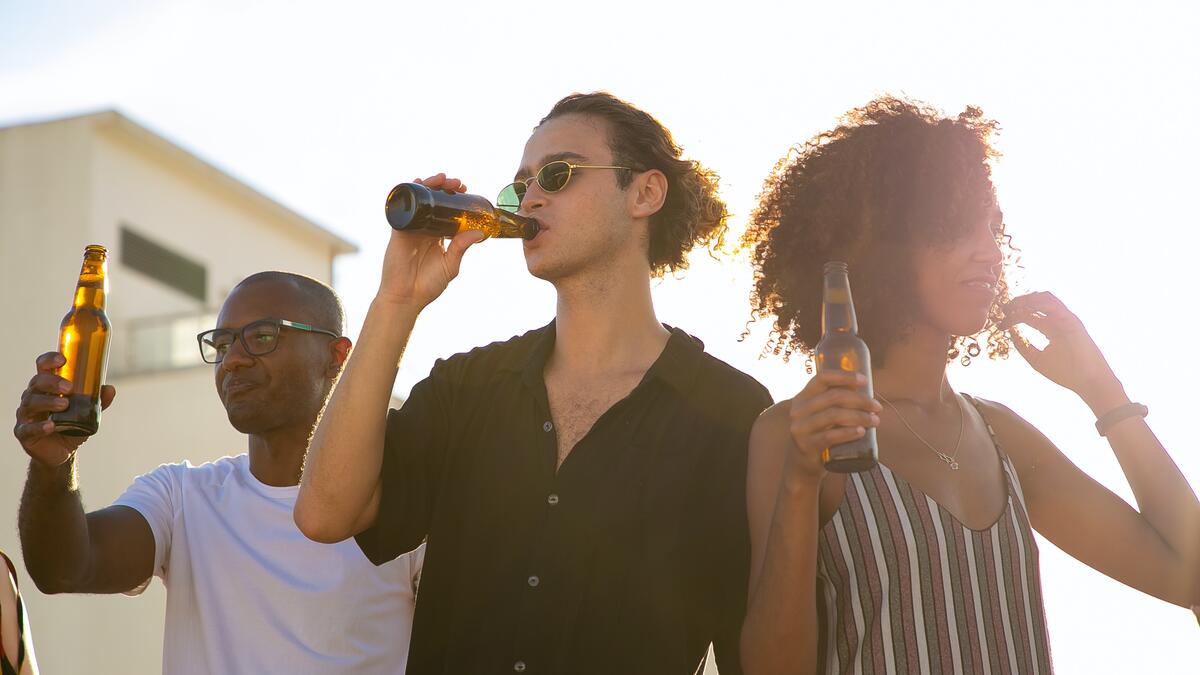Racial discrimination linked to drinking through mental health in Black college students

A new study published in Psychology of Addictive Behaviors found racial discrimination led to depressive symptoms and to problem alcohol consumption in Black college students. Positive feelings about being a Black American were associated with a weaker link between discrimination, mental health and alcohol use. Photo by Kampus Production/Pexels
Research has shown that excessive alcohol use disproportionately affects Black American college students, who experience more negative social and health consequences from drinking than their white peers.
A new study from Arizona State University and Virginia Commonwealth University has found that racial discrimination can lead to depressive symptoms and to problem alcohol consumption in Black American college students. Problem drinking is more common in college students than young adults who do not attend college, but the disparity in how alcohol use affects different people is not well understood in large part because there are few studies on minority populations. This work, which was published in Psychology of Addictive Behaviors in August, examined the pathways that lead to and protect against alcohol use problems in Black American college students.
“Black American college students drink less than their peers but are more likely to have problems from drinking. Understanding what the risks and protective factors are for this group is important,” said Jinni Su, assistant professor of psychology at ASU and first author on the paper. “Racial discrimination was related to worse mental health outcomes, which increased the risk for alcohol use and related problems.”
Discrimination is a known stressor that can lead to using alcohol as a coping mechanism.
“When people experience stress and lack strong coping skills or resources, they can turn to alcohol or substance abuse as a coping mechanism. We know from previous research that people who experience racial and ethnic discrimination are more likely to have problems related to excessive drinking,” Su said.
Racial discrimination was associated with alcohol use in two groups of Black American college students. The connection between the two was changes in mental health, in the form of increased depressive symptoms.
“Racial discrimination increased the risk for alcohol use and related problems, and this relationship was linked to worse mental health outcomes,” Su said.
The research team also examined whether how people think about their identity was protective against problem alcohol use. They assessed the impact of an individual having positive feelings about being a Black American and the belief that society at large has positive views about Black people.
Participants who had positive feelings about being a Black American had a weaker link between discrimination, mental health and alcohol use. But, the association between racial discrimination, mental health and alcohol use was stronger for the participants who thought that society viewed Black people positively.
“The impact of racial discrimination is not equal for everybody; it varies in part based on beliefs about identity,” Su said. “We found that participants who felt good about being Black were buffered from the effects of how discrimination might impact their mental health and drinking behavior. We also found that participants who think other people view them positively were more negatively impacted by discrimination, possibly because it is harder to understand unfair treatment.”
Eleanor Seaton, professor in the T. Denny Sanford School of Social and Family Dynamics, also contributed to the work along with Chelsea Williams, the Spit for Science Working Group and Danielle Dick from Virginia Commonwealth University.
This study was funded by the National Institute on Alcohol Abuse and Alcoholism, the National Center for Research Resources, National Institutes of Health Roadmap for Medical Research, National Institute on Drug Abuse, the Center for Tobacco Products of the U.S. Food and Drug Administration and Virginia Commonwealth University.
More Science and technology
Extreme HGTV: Students to learn how to design habitats for living, working in space
Architecture students at Arizona State University already learn how to design spaces for many kinds of environments, and now they…

Human brains teach AI new skills
Artificial intelligence, or AI, is rapidly advancing, but it hasn’t yet outpaced human intelligence. Our brains’ capacity for…

Doctoral students cruise into roles as computer engineering innovators
Raha Moraffah is grateful for her experiences as a doctoral student in the School of Computing and Augmented Intelligence, part…